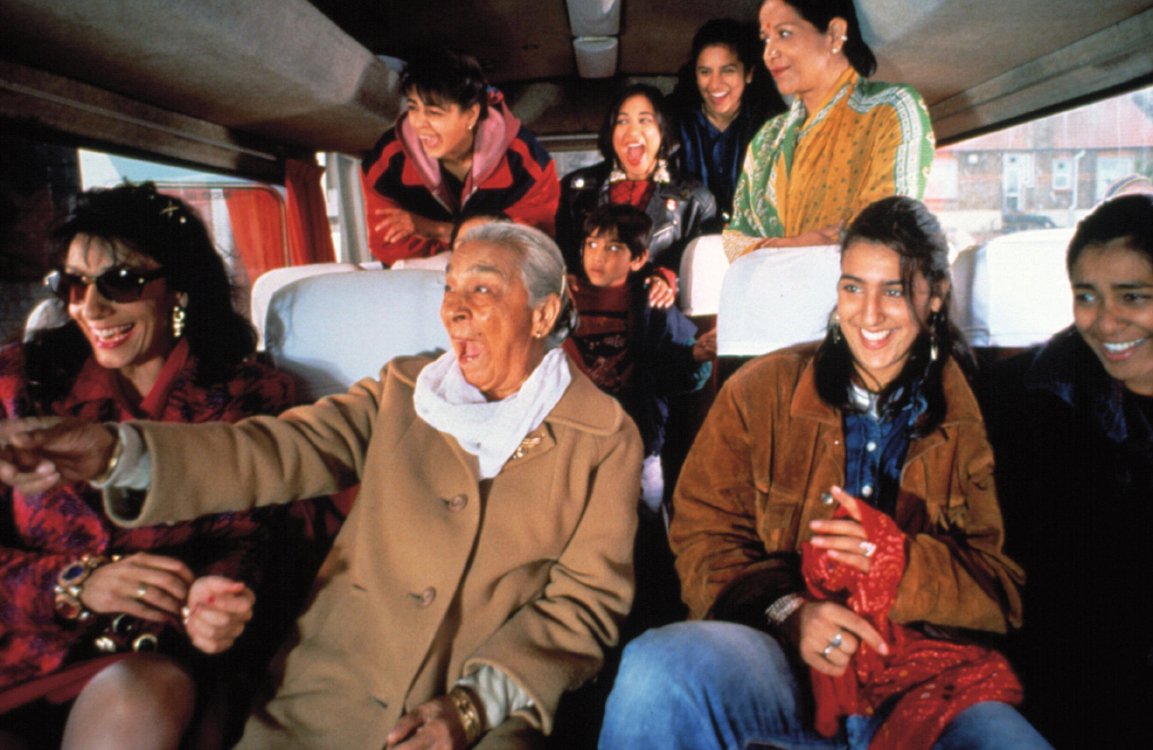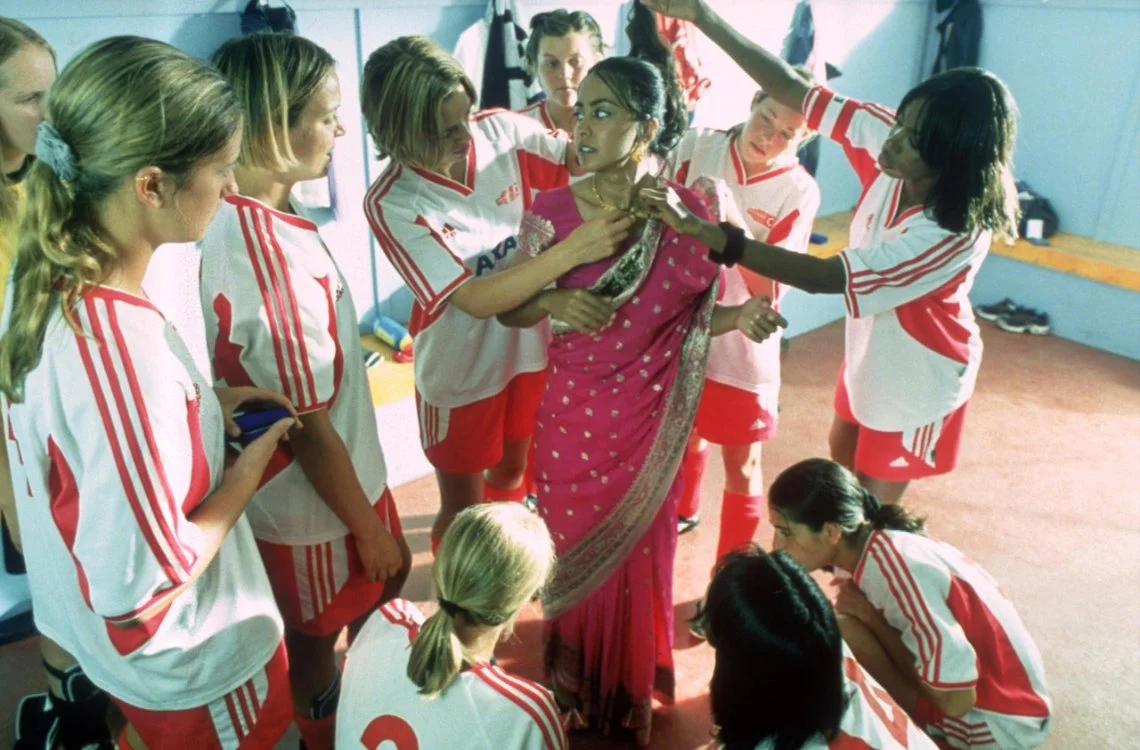Bhaji vs Beckham - The White Saviour - Key to Bend it Like Beckham’s Success?
One of the most successful directors of her generation, Gurinder Chadha, is best known for feelgood hit Bend it like Beckham (2002), which launched the transatlantic careers of leading stars Parminder Nagra, Keira Knightley and Archie Punjabi. Proving a celebratory British South Asian narrative with female leads, could have mainstream appeal, it proudly displays multicultural Britain, with Jess (Parminder Nagra) and Jules (Keira Knightley)’s friendship blossoming through a shared love of football, set against a backdrop of a distinctive and now acceptably British, Southall community.
In retrospect, there are some dated perspectives around race, gender and sexual identities; cringey ‘lesbian-fear’ rumours about football-playing females fuelled by gossiping mothers, while the main character’s biggest dilemma is…the right to play football? A reflection of its time? The Noughties might be behind the ‘90s’ then. Chadha’s earlier creation, Bhaji on the Beach (1993) has a female-centered narrative handling taboos of pre-marital pregnancy, interracial relationships and positive Black representation that Bend it like Beckham undoes.
The film does demonstrates how far race relations and immigrant communities have progressed since Bhaji; still emerging from the National Front era, with shopkeepers quietly scrubbing away swastika graffiti from rundown shop fronts. It capitalised on the continuing Brit Asian pop culture trend (now mostly just R’n’B-Bhangra mainstream crossovers), with a cameo appearance by hit-group B21, and British adulation for all things US during the Blair-Bush era, with Jess and Jules jetting off to play soccer Stateside; mirrored off-screen by lead actors (and even namesake Beckham) relocating to LA for lucrative opportunities.
Beyond the ‘multicultural’ surface, meaningful cross-racial interaction is missing, with white and brown supporting characters only brushing shoulders politely, while behind the long-awaited sight of a South Asian female protagonist, is a white saviour complex. Jess can only play football with the help of coach Joe (Jonathan Rhys Meyers), who convinces her mild-mannered migrant father Mr Bhamra (played by Bollywood heavyweight Anupam Kher) – a touching tribute to Chadha’ own late father - to support his daughter’s dreams.
Jess’s best mate Tony (Ameet Chana) is another unthreatening brown man; hiding his gay identity to conform; even offering to marry Jess to safely hide from the threat of homophobic community backlash. These contrast the brash women, Pinky (Archie Punjabi) and Monica (Preeya Kalidas), while supporting characters (Monica and Tony’s friends), whilst warmly entertaining, feel more like caricatures than three-dimensional characters, compared to Bhaji’s ensemble cast.
‘Modern girls’ Jess and Pinky are still expected to partake in domesticated duties in traditional garb, while Pinky’s engagement (despite choosing a partner herself from the same community) is easily threatened by negative gossip about her sister. The fathers are calm and reasoned, while mothers, played by Shaheen Khan and Juliette Stevenson, are hysterical and at times, ignorantly dumb, with Jules’ mother assuming her daughter and Jess are in a relationship together because they play football. Is there no room to explore older female perspective beyond domesticated, patronising stereotypes?
Mel (Shaznay Lewis of successful 90’s girl-group All Saints) offers black female representation but her opening changing room scene shows how black, brown and white female bodies are treated; Jules is ‘perfect’, Mel is immediately hypersexualised in an opening close-up cleavage shot and Jess, too embarrassed to undress because of her scarred legs, is taught not to expose or sexualise herself inappropriately.
Only recently are desirable brown bodies being seen on the small screen, perhaps in part to today’s generation claiming the online space (and bodies and sexualities), alongside increasing privilege and confidence to question the status quo. Would the casting team of Bend it Like Beckham have been threatened by someone that looked like supermodel Neelam Kaur Gill?
The achievements of previous generations have split the South Asian community into segregated sub-groups, each entrenched in traditions and views. While Bhaji‘s younger characters challenge prejudices, Bend It’s Jess simply accepts the consequences: ‘don’t marry a white boy, or a black boy and definitely not a Muslim’. Speaking of interracial romance, that storyline doesn’t get steamy on screen, except a single, sweet kiss at the end. Before that, it’s Bollywood-censored stolen glances and Jess is punished for ‘nearly’ kissing Joe at a tournament abroad, caught by best friend Jules, who is also crushing on him, and dutifully chooses football before blossoming love with the white boy. Can’t she have both?
Jess also accepts segregated worlds and literally runs between them; a football match (mainstream western culture) and her sister’s wedding (traditional South Asian culture). There’s a glimmer of the possible integration in a cute moment of Jess’ teammates gathering to redress her sari.
Poor Jess can’t win confronting racism on pitch either. Punished for defending herself despite playing well, she states her case to Joe, who retorts back that “of course he understands racism, he is Irish after all”. A doubly complex response from a white man. Can he truly understand the experiences of a brown woman whilst sharing solidarity in their experiences of English colonisation, racism, migration and even cultures – surely Joe’s extended Irish family would have been right at home at Pinky’s Punjabi wedding party?!
The brown girl dilemma of ‘pleasing yourself’ pops up again but it’s Joe, rather than a fellow brown girl, who tells Jess: “Who’s life are you living? If you are pleasing everyone forever, you’re going to end up blaming them.”
It appears like allyship but feels disempowering when only the white male voice of reason, backed by subservient brown male voices, can bring acceptance. Ultimately, white patriarchy convinces Mr Bhamra and only then, can Jess speak up for herself, whereas Bhaji’s women speak up for themselves and in solidarity with fellow brown sisters, despite the risks. Hashida says her truth, not because her boyfriend tells her to but on her own choice and terms, whilst balancing a specific matrix of familial, cultural and societal pressures.
Chadha’s talent is brought to a mainstream audience but framed within a white, male gaze that controls the narrative (an easily digestible British Asian ‘multiculturalism’) and ‘saves’ Jess. We’re too busy enjoying, both wrongly and rightly so, a rare treat of South Asian comedy-drama story-telling, just like previous generations did with sitcom ‘Mind Your Language’.
Words: Reshma Madhi











